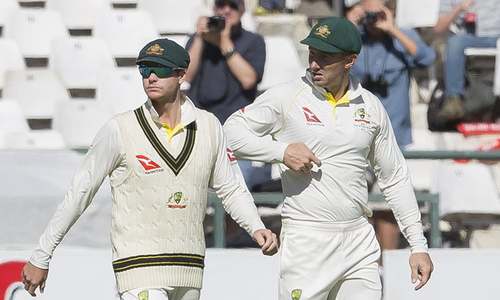Australia’s humiliating loss to South Africa in the recently concluded Test series is a testament to the fact that it is the skills that win you games, not the tactics or mind games that teams often resort to these days.
For a team that has thrived on sledging, hurling abuses at the opposition and not shied away from trying to win games by unfair means, it was only fitting that Australia got the taste of its own medicine. For once, the Aussies were at the receiving end of it and had zero sympathy from their own cricket board and fans.
It’s a shame that a series, which in an ideal world should be remembered for how South Africa made the Australians toil in the field, will be known for an outrageous display of poor sportsman spirit by the Aussies.
From David Warner, the vice-captain of Australia, fighting in the dressing room with Quinton De Kock in the first Test to him getting banned along with skipper Steven Smith and opener Cameron Bancroft in the third, the Aussies indeed left a bad taste in the mouth for fans and purists alike who had otherwise enjoyed a dominating South African performance at home.
Surprisingly, soon after his tiff with De Kock, it was Warner who had said that there must be a ‘line’ that the players should not cross. “His comments about my family were out of line,” stated Warner after he was slapped with a level-two charge.
How things unfolded in the Test series are no mystery and makes one wonder whether there was any ‘line’ for playing by fair means in the Australian dressing room to begin with. When the ball-tampering issue came to the limelight, the Australian media and the former players were quick to label it as an “error of judgment” when it should have been called for what it was - “cheating”.
Both Steve Waugh and Michael Clarke, the former captains of Australia, had also expressed their disbelief at how things progressed in the third Test in Cape Town.
The question is whether their disapproval of such an incident holds any importance since both the former captain were themselves known for promoting the boorish behaviour towards the opposition in their playing days. From Waugh claiming a catch when the ball had clearly bounced in front of him in his early playing days to Clarke telling James Anderson in the Ashes series to get ready for a broken arm when Australia were comfortably winning over England, their criticism of the tampering row only exposed their hypocrisy.
However, Cricket Australia should be lauded for trying to set a precedent for the rest of the cricketing boards by banning Warner and Smith each for one year and Bancroft for nine months. The real question is, though, that what made them do it? The ICC had imposed only one match ban on Warner and Smith and fined them 100% match fee whereas Bancroft was fined 75% match fee only soon after the ugly incident.
Was it their Prime Minister’s address to the media that compelled them to take a pre-emptive measure to avoid any such incident in future by banning players? Or was it all politically motivated in the end?
When Smith arrived in Australia and broke down in tears in front of the media, he instantly managed to find sympathies from all corners of the cricketing world. The same act was repeated by a ‘distraught’ team coach Darren Lehmann - who announced to resign from his post after the series - and David Warner.
One really wonder if better sense has finally prevailed with Cricket Australia now, when in reality such a culture has only thrived under its supervision during the past.
Published in Dawn, April 6th, 2018













































